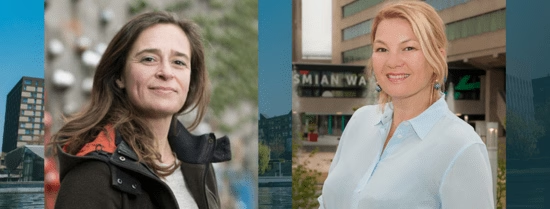For the first time, Erasmus University Rotterdam (EUR) is appointing Erasmus Professors. They will start work from 1 January 2023 with the special task of further realising EUR's mission: creating positive societal impact. During the university's 109th anniversary celebrations this afternoon, Rector Magnificus prof. Annelien Bredenoord announced that these special positions have been assigned to the two distinguished scientists prof. Eveline Crone and prof. Moniek Buijzen.
Annelien Bredenoord: "We are delighted with the appointment of these two professors to such a strategic position. They are among the absolute vanguard in their fields and are frontrunners in terms of impact." The Erasmus Professors are to stimulate the academic intellectual climate and bring scientists together. They are expected to collaborate on creating multidisciplinary societal impact for the EUR from within various disciplines, with different experiences and expertise. "Eveline Crone and Moniek Buijzen have already shown in many ways that they excel in such collaborations and are able to realise research and education that transcends disciplines, faculties and even organisations," Bredenoord says.
The Erasmus Professors are appointed for a period of five years. During this period, they are given space and budget to achieve ambitious goals. From now on, a new Erasmus Professor will be appointed annually, each time for a period of five years. In exceptional cases, this period could be extended once. The aim is to create a pool of Erasmus Professors, each from their own background and expertise, working together according to an interdisciplinary, inter-faculty approach and beyond the walls of EUR, to create positive societal impact.
Cooperation creates impact
Prof. Eveline Crone, Professor of Developmental Neuroscience in Society, and prof. Moniek Buijzen, Professor of Communication and Behaviour Change, feel honoured by the appointment as Erasmus Professor. "You could say that everything that happened in our careers so far was a prelude to this position of Erasmus Professor," the two professors said.
Over the past two Corona years, we have experienced that we work well together – and enjoy the process. We also jokingly refer to each other as 'Corona lockdown buddies'. And that is exactly what we want to portray: working together creates much more impact."
"You could say that everything that happened in our careers so far was a prelude to this position of Erasmus Professor"
Crone and Buijzen envision tackling societal problems through co-creation with stakeholders. In doing so, they effectively build on the many developments and partnerships they have already realised in recent years. This position allows them to initiate even more in those research areas and generate more attention to them. On top of that, they want to bring education and research closer together. As part of this process, they want to collaborate more with science networks.
"In fact, we do not see these positions as individual, rather they should lead to a joint Erasmus scientific table at which everyone should be able to sit," Buijzen and Crone point out. In doing so, they also want to continue to involve young researchers and students, for instance through mentorship.

Frontrunners
Prof. Eveline Crone is professor of Developmental Neuroscience in Society at the Erasmus School of Social and Behavioural Sciences. She leads the SYNC lab (Society, Youth and Neuroscience Connected). Within this initiative, researchers from different disciplines, such as neuroscientific and behavioural research, work together to understand how young people develop into active members of society. On top of that, Crone leads the research consortium GUTS: Growing Up Together in Society, which was honoured with a 22 million euro grant (Zwaartekrachtsubsidie) in May 2022. The aim of this research project is to discover how young people can successfully grow up and contribute to current and future society. The consortium consists of 19 researchers from various Dutch universities and research institutes. In addition, Crone has a leading role in 'Healthy Start', a research programme with colleagues from EUR, Erasmus MC and TU Delft as part of the convergence between these three institutions.

Prof. Moniek Buijzen is professor of Communication and Behavioural Change at the Erasmus School of Social and Behavioural Sciences. She is involved in the consortium 'The Algorithmic Society' (ALGOSOC), which in May 2022 was honoured with a 21.3 million euro grant (Zwaartekrachtsubsidie). This programme investigates how public values and human rights can be safeguarded within the development of (semi-)automated processes (such as Artificial Intelligence - AI).
In addition, Buijzen is scientific leader of the Erasmus Initiative programme 'Societal Impact of Artificial Intelligence'. Within this innovative and interdisciplinary programme, researchers, together with key stakeholders, define the frameworks for the use of AI that benefits people and society. Buijzen also leads the Movez Lab.
Within this lab, various research projects take place (SocialMovez, MediaMovez, AiMovez) aimed at using (online) media to promote the health and well-being of young (online) media users. To this end, the researchers within the Movez Lab work together with many Dutch network organisations and (research) institutes.
- Professor
- Professor

